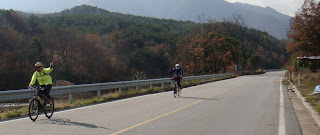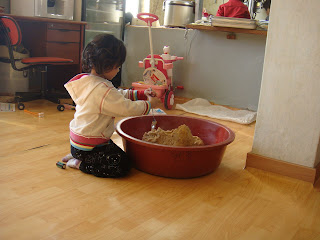Birthrate incentives need to focus of returning women to the workforce.
Korea's incredibly low birthrate has been in the news a lot lately and I recently promised a serious post on the subject. I will try to keep this post 'serious' but I am not sure how deep or authoritative it will be. It may be serious in tone, but not so much in length. alright, it is finished and it is a serious length, I would say.
The government will soon launch a nationwide anti-abortion campaign and aggressively seek more foreigners to come and settle down here as part of efforts to keep the country's population from shrinking, a presidential council said Wednesday.
According to Yonhap News, the move comes as the country again marked one of the lowest birthrates in the world this year.
Let me start with the bad. I am moderately pro-choice: there are good reasons to have an abortion and there are terrible reasons for having an abortion. With one exception, I would like to separate this the subject of abortion from birthrate. That exception is abortion due to the gender of the fetus. I may return to this point later.
The plans to increase immigration are interesting. I've been in Korea for a long time, possibly too long, but am not sure how educated I am about the culture (Two humourous links on the subject:
asktheexpat,
dokdoisours - back to serious-stuff) but this contradicts everything I know about minjok and keeping bloodlines pure. I like the idea of Korea being more multi-cultural and being more a part of the world than it currently is, but it's clear we aren't thinking about birthrates anymore.
Recognizing the grave nature of this matter, the Presidential Council for Future and Vision proposed Wednesday a package of measures to lift the birthrate and provide support for childcare and education. One of the steps is to offer incentives for families with three or more children which include special interest rates on their mortgages. Third or additional children can also receive bonus scores on college entrance exams and job applications
...
The government has so far announced a series of different measures to promote marriages and childbirth to avert a looming population crisis. But we have to admit that those measures have proven to be unsuccessful at producing tangible results.
The Times also mentions immigration and the seriousness of Korea's low birthrate, but that's not the focus of this post.
The news about mortgages and universities is definitely part of this post.
I can't hold back from saying that it is so weird reading about such a strong government involvement in increasing the birthrate, when in the recent past, having more than one child in China would invite negative government involvement.
Alright, mortgage relief does sound like a good idea and it directly addresses the problem of finding a home big enough for a large family. Scholarship and financial assistance would also help. On the other hand, boosting a university entrance exam score and moving a job application higher in it's queue sound terrible.
The
Chosun describes two reasons for the low birthrate. The first is the high cost of raising a child, and the second, related, is the high cost of being a senior citizen:
Advanced countries offer comprehensive welfare benefits. They not only support the cost of raising children, but also guarantee the financial stability of elderly citizens after retirement. But the situation is quite different for the average Korean worker, who faces the constant threat of layoffs, may have already cashed in his pension, and lives in a nation where programs such as annuity insurance to prepare for life after retirement are just budding. Everyone feels pressured to have fewer children so they can save for retirement.
Here is a point that sounds exactly right to me. I already see myself working until I am grey and bent over, then moving into a grim storage locker for my final days. I will spend whatever it takes to raise a great child, but fear the cost of a second child.
We've heard enough from the papers; here are my thoughts.
I like the increased immigration plan for a variety of reasons. It will bring more productive people to Korea and possibly decrease overpopulation elsewhere. There might be a win-win thing going here and that always feels good. I hope that immigrants can send some money home and take home some expertise to further assist other countries. Unfortunately, this would dilute Korean stock and culture - while I don't have much respect for 'pure blood', I don't like the homogenization, the McDonald'sification of the world. I guess this is a luxury that we must do without to better care for our seniors.
While I do like the financial aid, I don't think it is fixing the specific limiting reagent involved. I am a feminist and know that, in my profession, women are at least as capable as I. Yet, somehow, women must be convinced to give up a year of professional growth, and probably longer. Indeed, it almost has to be longer; after a year away from work, upon her return, a women might reasonably be less efficient than a man who has not taken time from work. Presuming this is a traditional family with a wife and husband, it makes better financial sense for the man to keep working and the woman to stay home as long as is best for the child.
I love my son and love most of the time I spend with him but I also enjoy working and my job. Most women feel the same way, I expect. If a woman is being asked to have two or three or more children, that is a long time away from the workforce.
All this means women need educational and employment assistance for themselves as much as their children do.
--
Near the top of this post I mentioned abortion and new restrictions. I can see that a lack of abortion services might raise the birthrate, but I foresee not only more children, but more miserable children. I felt this way in the post leading up to this one - it described plans to lower the minimum age to enter school. As a childish adult, I want to see happier children; children who are able to enjoy childhood, more than I want to see more children in general. The Times touches on this point with "some education experts express concerns that the measure may bring about side effects such as children's difficulty in adapting themselves to school life at a younger age. They point out that education should not be tackled only from the point of economic efficiency."

























